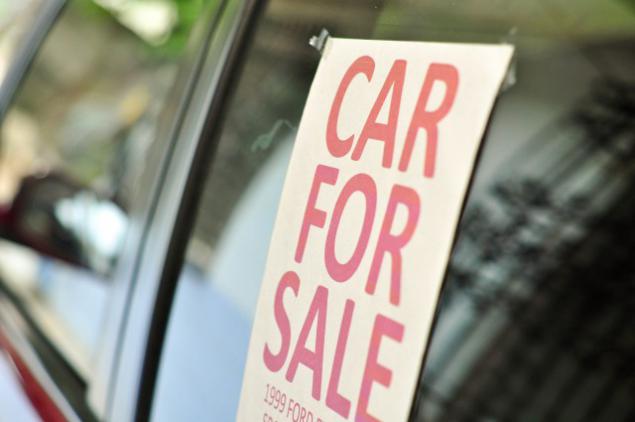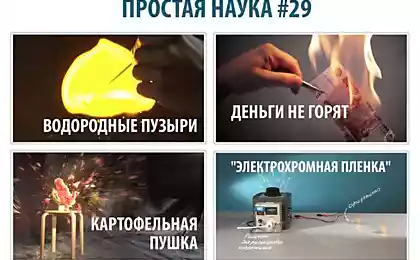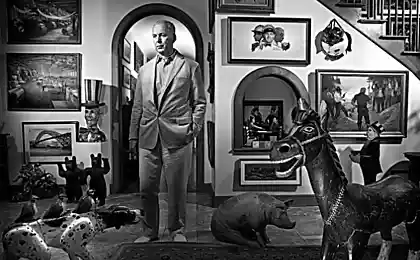794
How to sell anything
Several techniques and scientific podoplekaEsli you were told that this is the most important article that you read in this week, you probably would have reacted to the skeptical. But what if I said that 75% of your friends feel the same way? And how about the fact that 9 out of 10 people of the same age, education and income levels, as you have found the article extremely useful? You agree that such statements would boost your curiosity for what is written below.

Skilled sellers use effective sales strategies, often without even knowing how or why they work - but they work. We like to think that we are immune to manipulation, but it is the manipulation of the buyers are still moving trade forward. So, let's discuss in what ways the sellers make buyers to give them their money, and how it works.
1. Make false sravneniyaVzyat, for example, methods used car sales. In the early 2000s, Robert Levine, a professor of social psychology from the University of California to study posed as a seller of used cars. In his book "The Power of persuasion," he says, "Offering the car, I was afraid to fail if I can not remember all information about the various models." However, Levine quickly realized that the majority of sellers of used cars actually remember a few basic facts, which are used for all models. It was important to show the cars in a strategic manner.

At the same time sellers are using the concept of "ignorance of the base rate." When the buyer does not know the true value of the product, and the value of used vehicles, including, it is difficult to evaluate the product without the preliminary work. The seller sets the base rate and use it to highlight the exceptional value of another product comparisons.
"If several espresso machines for the price of $ 200 to put next to the espresso machine at an inflated price of $ 400, the $ 200 machine will look more attractive." Levine explains: "The effect will increase even more if you have an experienced dealer who will say that the machine is $ 400 really is no better than the others. But the reality is that most of us probably have no idea how much should cost an espresso machine ».
However, Levine even understanding of the psychology of sales did not help. He says he was hopeless at selling cars and he was able to sell only one car during the experiment.
Perhaps if Levine, a white 50-year-old man who would sell cars exclusively to other middle-aged white men or anyone named Robert, Bob or Bobby, you would earn larger commissions. And that's our next tip involves ...
2. Emphasize the social chertyIssledovaniya shown that we tend to buy from people who are anything like us, we trust them more, even if our similar characteristics are secondary.

Jerry Burgess, professor at the University of Santa Clara, studying when and how people often agree to comply with requests that have personalized value. His findings are very important for the understanding of sales techniques and manipulate consumer behavior.
For example, in one series of experiments, Burger and his colleagues have shown how perceived coincidence. The same birthday or the name may change our attitude toward man.
In the first study, students were taken to the lab ostensibly to participate in the study of astrology. In the study, participants found that they were born the same day as researchers. Later, they were asked to comply with the request - to analyze the eight-page document. Participants who thought that the date of birth coincides with the date the requesting employee, agreed almost twice as often.
In the second study, the women organized a fundraiser for research of cystic fibrosis. If the name of the collector on the name badge matches the name of the party, he donated an average of 2 times more money than those who had a different name.
Even more interesting is that when participants showed a photo of a girl with cystic fibrosis and their names are the same, they gave less money than if they were told that the girl has a different name. Apparently, the similarity with the collectors, rather than a potential beneficiaries to a larger donation.
3. Create the illusion sprosaEst another trick for a successful sale today. It was published in the bestselling UES! "50 Scientific proven ways to be convincing." The stories told there Collin Zot, which is considered one of the most successful writers in advertising, famously changed the call to action in commercials.
Instead of "The operators are waiting, please call now," he suggested, "If operators are busy, please call again later." This subtle change called "social proof" (the principle that we look at the others to make their own decisions) and led to an increase in sales.
A limited number of shows that other people buy this product. Implicitly, it also recalls the deficit, to which we are very sensitive. Simply put, we hate to miss a unique opportunity, even if it is actually possible is not so unique.

In another series of experiments, Burgess and his colleague David Caldwell showed that people are more likely to take action if the perceived opportunity to do so unique. For example, in one study, participants were assessed products that are usually sold in the US college campuses, including road insulated cups.
Investigators have hinted participants that circles in actual fact sold at a discounted price. Some of the participants have begun to say that the clubs are in short supply and that they can buy only those who have pulled out of the hat a qualifying ticket. Of course, the "lottery" participants often offered to buy the mug.
4. Distribution of profit associated raskhodyBolshuyu popularity had broadcast advertising Ginsu knife in the late 1970s - early 1980s. The firm was one of the first to use the technique, "But wait! There's more! "The advertisement offered a kitchen tool" six in one ": cutting fork, set of steak knives with sharp spiral in addition to the now famous knife. This is an example to describe the benefits over time. Sales will be less effective if you talk about all the benefits immediately.
We prefer to do all their shopping in one go. How to use this feature vendors can demonstrate car dealer who tries to sell you something in addition to the car at the time of purchase. He knows that the best time to convince you to spend more $ 200, this is when you have already spent much more money.
5. Call feeling dolgaIssledovaniya show that when people get from someone benefit, they feel obligated to respond in kind. Sociologists call this the "norm of reciprocity". This feeling can be strong. In a 2006 study Burger and his colleagues found that people who have already responded in kind to another, will likely still want to bring some benefit, at least for a short period of time.
Sellers are well aware of how to use these behaviors in their own interests. "Very often the sellers of extra effort, use all kinds of gestures that you it was difficult to say no. "People do not feel comfortable taking something for free, or spending one's time and effort, not being able to bring them back - says Burger. - This is a tricky technique, as a sense of duty is very difficult to fight ».
6. Think emotsionalnoOsobennoe impact on us has stress or doubt about the correctness of our actions. "We do not have the time or resources to ask ourselves whether we made the right decision", - he said.
Some studies have shown that emotions affect our business activities - both buyers and sellers. A 2004 study, for example, showed that the participants are willing to spend 30% more, looking sad movie, which saw the first time. Sellers who watched this sad clip were willing to sell the item is 33% cheaper.
Another study, in 2004, suggests that people who are judged especially emotionally, decreased ability to perceive differences in the quantity and assign the appropriate values in a rational way.
As for Levin, thanks to research, he received recognition for smart sales techniques and the fact that he managed to combine science and creativity. This estimate is seen them with caution, although he says that does not accept free gifts.
via www.bbc.com/future/story/20150428-the-subtle-science-of-selling

Skilled sellers use effective sales strategies, often without even knowing how or why they work - but they work. We like to think that we are immune to manipulation, but it is the manipulation of the buyers are still moving trade forward. So, let's discuss in what ways the sellers make buyers to give them their money, and how it works.
1. Make false sravneniyaVzyat, for example, methods used car sales. In the early 2000s, Robert Levine, a professor of social psychology from the University of California to study posed as a seller of used cars. In his book "The Power of persuasion," he says, "Offering the car, I was afraid to fail if I can not remember all information about the various models." However, Levine quickly realized that the majority of sellers of used cars actually remember a few basic facts, which are used for all models. It was important to show the cars in a strategic manner.

At the same time sellers are using the concept of "ignorance of the base rate." When the buyer does not know the true value of the product, and the value of used vehicles, including, it is difficult to evaluate the product without the preliminary work. The seller sets the base rate and use it to highlight the exceptional value of another product comparisons.
"If several espresso machines for the price of $ 200 to put next to the espresso machine at an inflated price of $ 400, the $ 200 machine will look more attractive." Levine explains: "The effect will increase even more if you have an experienced dealer who will say that the machine is $ 400 really is no better than the others. But the reality is that most of us probably have no idea how much should cost an espresso machine ».
However, Levine even understanding of the psychology of sales did not help. He says he was hopeless at selling cars and he was able to sell only one car during the experiment.
Perhaps if Levine, a white 50-year-old man who would sell cars exclusively to other middle-aged white men or anyone named Robert, Bob or Bobby, you would earn larger commissions. And that's our next tip involves ...
2. Emphasize the social chertyIssledovaniya shown that we tend to buy from people who are anything like us, we trust them more, even if our similar characteristics are secondary.

Jerry Burgess, professor at the University of Santa Clara, studying when and how people often agree to comply with requests that have personalized value. His findings are very important for the understanding of sales techniques and manipulate consumer behavior.
For example, in one series of experiments, Burger and his colleagues have shown how perceived coincidence. The same birthday or the name may change our attitude toward man.
In the first study, students were taken to the lab ostensibly to participate in the study of astrology. In the study, participants found that they were born the same day as researchers. Later, they were asked to comply with the request - to analyze the eight-page document. Participants who thought that the date of birth coincides with the date the requesting employee, agreed almost twice as often.
In the second study, the women organized a fundraiser for research of cystic fibrosis. If the name of the collector on the name badge matches the name of the party, he donated an average of 2 times more money than those who had a different name.
Even more interesting is that when participants showed a photo of a girl with cystic fibrosis and their names are the same, they gave less money than if they were told that the girl has a different name. Apparently, the similarity with the collectors, rather than a potential beneficiaries to a larger donation.
3. Create the illusion sprosaEst another trick for a successful sale today. It was published in the bestselling UES! "50 Scientific proven ways to be convincing." The stories told there Collin Zot, which is considered one of the most successful writers in advertising, famously changed the call to action in commercials.
Instead of "The operators are waiting, please call now," he suggested, "If operators are busy, please call again later." This subtle change called "social proof" (the principle that we look at the others to make their own decisions) and led to an increase in sales.
A limited number of shows that other people buy this product. Implicitly, it also recalls the deficit, to which we are very sensitive. Simply put, we hate to miss a unique opportunity, even if it is actually possible is not so unique.

In another series of experiments, Burgess and his colleague David Caldwell showed that people are more likely to take action if the perceived opportunity to do so unique. For example, in one study, participants were assessed products that are usually sold in the US college campuses, including road insulated cups.
Investigators have hinted participants that circles in actual fact sold at a discounted price. Some of the participants have begun to say that the clubs are in short supply and that they can buy only those who have pulled out of the hat a qualifying ticket. Of course, the "lottery" participants often offered to buy the mug.
4. Distribution of profit associated raskhodyBolshuyu popularity had broadcast advertising Ginsu knife in the late 1970s - early 1980s. The firm was one of the first to use the technique, "But wait! There's more! "The advertisement offered a kitchen tool" six in one ": cutting fork, set of steak knives with sharp spiral in addition to the now famous knife. This is an example to describe the benefits over time. Sales will be less effective if you talk about all the benefits immediately.
We prefer to do all their shopping in one go. How to use this feature vendors can demonstrate car dealer who tries to sell you something in addition to the car at the time of purchase. He knows that the best time to convince you to spend more $ 200, this is when you have already spent much more money.
5. Call feeling dolgaIssledovaniya show that when people get from someone benefit, they feel obligated to respond in kind. Sociologists call this the "norm of reciprocity". This feeling can be strong. In a 2006 study Burger and his colleagues found that people who have already responded in kind to another, will likely still want to bring some benefit, at least for a short period of time.
Sellers are well aware of how to use these behaviors in their own interests. "Very often the sellers of extra effort, use all kinds of gestures that you it was difficult to say no. "People do not feel comfortable taking something for free, or spending one's time and effort, not being able to bring them back - says Burger. - This is a tricky technique, as a sense of duty is very difficult to fight ».
6. Think emotsionalnoOsobennoe impact on us has stress or doubt about the correctness of our actions. "We do not have the time or resources to ask ourselves whether we made the right decision", - he said.
Some studies have shown that emotions affect our business activities - both buyers and sellers. A 2004 study, for example, showed that the participants are willing to spend 30% more, looking sad movie, which saw the first time. Sellers who watched this sad clip were willing to sell the item is 33% cheaper.
Another study, in 2004, suggests that people who are judged especially emotionally, decreased ability to perceive differences in the quantity and assign the appropriate values in a rational way.
As for Levin, thanks to research, he received recognition for smart sales techniques and the fact that he managed to combine science and creativity. This estimate is seen them with caution, although he says that does not accept free gifts.
via www.bbc.com/future/story/20150428-the-subtle-science-of-selling























